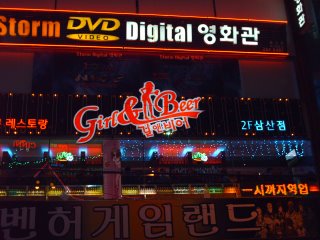An American in Ulsan
An electronic account of the life and times of the author as EFL instructor outside of Ulsan, South Korea.
Wednesday, October 25, 2006
Due to technical difficulties (namely a dead computer) I will be taking a (hopefully) short and reluctant hiatus from posting. As soon as I have the necessary equipment again, I will write an update on all that happens in the interim. But in the meantime I wanted to post this message so no one out there thought I was dead!
Monday, October 23, 2006
New 'Do Reactions/Calling All Theory Dorks
Some of my students' reactions today to my new haircut were too priceless not to be shared here. Most of the young girls went out of their way to call me "ugly," one student suggested that the job hadn't been finished and that I should return to the salon for a touch-up, and others thought it was an improvement over my old hairstyle (my Korean colleagues said that I looked "much better," and one of them, Mr. Lee, insisted that I looked so much younger that he couldn't tell the difference between me and a student). But the best reactions were from the elementary school boys who made comparisons between me and several different international soccer stars. The haircut I have now is commonly known as "Beckham style" among the Koreans, so David Beckham was an obvious point of comparison (which I thought was quite flattering since I don't think I could ever claim that I look like Beckham), but I was also called "Zidane" (hopefully, I'm not that bald yet), and, by far the oddest, Thierry Henry (who, for those of you that don't know, isn't white and whose hair doesn't look even remotely similar to mine).
On a more serious note, I've begun to notice something in one of my students, "Alex," that interests me from a linguistic standpoint. He has some difficulty distinguishing between pronouns and employing the correct personal referent. Instead of employing a self-referential pronoun like "I" or "me" (or even "my," which many of my students use as a stand-in for "I," but that's another issue entirely), he refers to himself as "you." I believe that this habit comes from hearing me and his other teachers ask him questions like, "Alex, what do you like?" At some point, he must have equated "Alex" and "you" in his mind. I notice it especially when I play Hangman with his class (which happens more often than I would like, but it does keep them under control). Alex always rushes up to me and shouts "You Hangman!" while pointing at his chest, meaning that he wants to pick the vocabulary word for the game. Alex's problem reminds me of a story a professor once told my seminar about her daughter when she was an infant. Whenever her daughter wanted to be picked up she would turn to her parents and ask, "Pick you up?" meaning "Will you pick me up?" If I remember correctly, some theorist who works/worked on language acquisition in children (Vygotsky? Chomsky?) did some work on referent-confusion, or whatever you want to call it, so if any of you theory dorks out there know who it was, please leave a comment because I would love to know.
One final note: as I write this, my main man Choi Hong-Man is doing the limbo on a Korean game show; truly one of the funniest things I've ever seen on Korean TV.
On a more serious note, I've begun to notice something in one of my students, "Alex," that interests me from a linguistic standpoint. He has some difficulty distinguishing between pronouns and employing the correct personal referent. Instead of employing a self-referential pronoun like "I" or "me" (or even "my," which many of my students use as a stand-in for "I," but that's another issue entirely), he refers to himself as "you." I believe that this habit comes from hearing me and his other teachers ask him questions like, "Alex, what do you like?" At some point, he must have equated "Alex" and "you" in his mind. I notice it especially when I play Hangman with his class (which happens more often than I would like, but it does keep them under control). Alex always rushes up to me and shouts "You Hangman!" while pointing at his chest, meaning that he wants to pick the vocabulary word for the game. Alex's problem reminds me of a story a professor once told my seminar about her daughter when she was an infant. Whenever her daughter wanted to be picked up she would turn to her parents and ask, "Pick you up?" meaning "Will you pick me up?" If I remember correctly, some theorist who works/worked on language acquisition in children (Vygotsky? Chomsky?) did some work on referent-confusion, or whatever you want to call it, so if any of you theory dorks out there know who it was, please leave a comment because I would love to know.
One final note: as I write this, my main man Choi Hong-Man is doing the limbo on a Korean game show; truly one of the funniest things I've ever seen on Korean TV.
Sunday, October 22, 2006
Seonbawi
 Today I ventured out to Seonbawi (another of Ulsan's 12 scenic areas), the "Standing Rock" formation just outside of Beomseo with my roommate, Jessica, and our friend Melissa, a fellow Cheonsang-based wayguk. Although the skies were threatening to rain all morning long, the rain only started after we headed back towards Cheonsang. The picture above was taken from the bottom of small dirt trail behind a Buddhist temple which clearly wasn't well-traveled. As you can see, the leaves are beginning to change, although so far they haven't been nearly as impressive as the fall foliage in my New England home.
Today I ventured out to Seonbawi (another of Ulsan's 12 scenic areas), the "Standing Rock" formation just outside of Beomseo with my roommate, Jessica, and our friend Melissa, a fellow Cheonsang-based wayguk. Although the skies were threatening to rain all morning long, the rain only started after we headed back towards Cheonsang. The picture above was taken from the bottom of small dirt trail behind a Buddhist temple which clearly wasn't well-traveled. As you can see, the leaves are beginning to change, although so far they haven't been nearly as impressive as the fall foliage in my New England home.
Hair Queen
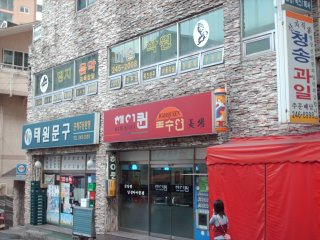 One of the best methods, in my opinion, of determining just how different the place you are currently living is from the place you know best is to do some of the seemingly mundane, everyday activities that you are familiar with back "home" (wherever that might be). Getting a haircut is just one of these activities; I find that if I have been somewhere long enough to need a haircut, then I truly am living there, not just visiting. I clearly remember my first haircut outside of the United States, in Chabanate, Morocco. The barber was a hip, young Moroccan man who was extremely excited that I had walked into his shop. He showed me to a chair, and then popped the tape of Arabic pop music (which I was kind of digging on, actually) out of his casette player and put on an old Tracy Chapman tape (I guess because that was more "appropriate" music for an American customer or whatever). He took the opportunity to practice his English with me and gave me his email address before I left (I think I may have emailed him once and never heard anything back). As to the haircut itself, he cut it shorter than I expected, using a straight razor on the back of my head, which was subsequently bright red for days. During my stay in Prague, I got two haircuts, one at the trendy Toni and Guy, where not only did I get a quality haircut but also the best scalp massage of my life, and one at a Macedonian barbershop where my friend Martin knew the brothers who ran the place. Both were similar to any haircut I could expect to get in the States.
One of the best methods, in my opinion, of determining just how different the place you are currently living is from the place you know best is to do some of the seemingly mundane, everyday activities that you are familiar with back "home" (wherever that might be). Getting a haircut is just one of these activities; I find that if I have been somewhere long enough to need a haircut, then I truly am living there, not just visiting. I clearly remember my first haircut outside of the United States, in Chabanate, Morocco. The barber was a hip, young Moroccan man who was extremely excited that I had walked into his shop. He showed me to a chair, and then popped the tape of Arabic pop music (which I was kind of digging on, actually) out of his casette player and put on an old Tracy Chapman tape (I guess because that was more "appropriate" music for an American customer or whatever). He took the opportunity to practice his English with me and gave me his email address before I left (I think I may have emailed him once and never heard anything back). As to the haircut itself, he cut it shorter than I expected, using a straight razor on the back of my head, which was subsequently bright red for days. During my stay in Prague, I got two haircuts, one at the trendy Toni and Guy, where not only did I get a quality haircut but also the best scalp massage of my life, and one at a Macedonian barbershop where my friend Martin knew the brothers who ran the place. Both were similar to any haircut I could expect to get in the States.My Korean haircut experience was a little different. I decided to walk into one of the salons that I pass everyday on my way to work, named "Hair Queen." I was the only customer early on a Saturday morning, and the middle-aged woman who operates the salon did not speak a word of English. My Korean is nowhere near functional enough to stumble my way through explaining what kind of haircut I wanted, so I resorted to paralinguistic measures. I pulled out my passport and pointed to my picture (which is six years old, by the way) and she nodded and smiled, understanding what I meant. She performed the haircut almost completely with an electric clipper and a comb, using a pair of scissors only once, and then only briefly. Afterwards, she gave my hair a rinse, placing a styrofoam mask over my face to prevent water from splashing into my eyes. All in all, I was quite satisfied and I can't wait to see how my students react on Monday.
Thursday, October 19, 2006
Techno Goliath
 This is a somewhat random post from me, but I felt compelled to share my favorite Korean celebrity of the moment with those of you who aren't here on the peninsula: Choi Hong-Man, a.k.a. "The Techno Goliath." Mr. Choi is a professional K-1 fighter (kickboxer), stands 7' 2", and weighs in at 360 lbs. These statistics would make him a large person anywhere, but he is especially large in Korea, both literally and figuratively. Not only is he successful on the K-1 circuit (a record of 9-2), but he is also a ubiquitous personality on Korean television, like any real-deal Korean celebrity (I believe he even has his own show; if anyone can verify this for me I would be grateful). As I was watching Korean TV last week, I saw him on no less than four local channels: two variety/game shows (including a hilarious guest spot on "6 Girls," which is fast becoming my favorite Korean TV guilty pleasure), a re-broadcasted K-1 match, and an advertisement for some sort of drink. Inevitably, his role on game shows revolves around his physical enormity relative to the the other stars. One of his most memorable appearances, in my opinion, pitted him in wrestling and jousting matches against a variety of opponents (including a couple of Korean Greco-Roman wrestlers), all about 1/3 of his size. However, he is also very charismatic, the archetypal "lovable oaf." Admittedly, my grasp of Korean doesn't allow me to fully appreciate his humor, but some of it needs no translation.
This is a somewhat random post from me, but I felt compelled to share my favorite Korean celebrity of the moment with those of you who aren't here on the peninsula: Choi Hong-Man, a.k.a. "The Techno Goliath." Mr. Choi is a professional K-1 fighter (kickboxer), stands 7' 2", and weighs in at 360 lbs. These statistics would make him a large person anywhere, but he is especially large in Korea, both literally and figuratively. Not only is he successful on the K-1 circuit (a record of 9-2), but he is also a ubiquitous personality on Korean television, like any real-deal Korean celebrity (I believe he even has his own show; if anyone can verify this for me I would be grateful). As I was watching Korean TV last week, I saw him on no less than four local channels: two variety/game shows (including a hilarious guest spot on "6 Girls," which is fast becoming my favorite Korean TV guilty pleasure), a re-broadcasted K-1 match, and an advertisement for some sort of drink. Inevitably, his role on game shows revolves around his physical enormity relative to the the other stars. One of his most memorable appearances, in my opinion, pitted him in wrestling and jousting matches against a variety of opponents (including a couple of Korean Greco-Roman wrestlers), all about 1/3 of his size. However, he is also very charismatic, the archetypal "lovable oaf." Admittedly, my grasp of Korean doesn't allow me to fully appreciate his humor, but some of it needs no translation.In other news, Ulsan Hyundai (Heavy Industries) fell to Chonbuk Hyundai (Motors) last night in AFC Champions League action, losing 6-4 on aggregate. I was able to catch the Tigers in action last weekend in a match against Jeju-Do, which they drew 2-2. My roomate and I both bought official supporter jerseys, and she ended up catching one of the promotional team balls that was kicked into the stands before the start of the match. Also, we befriended a group of local kids who remembered seeing us the last home match Ulsan had. It seems that even on weekends, I can't escape the hagwon "brats."
Sunday, October 15, 2006
View From The Top
 I haven't posted any pictures in a while, so I thought I would put up this view of Cheonsang from the summit of Munsu-san that I snapped during my hike yesterday. Unfortunately, it was a very hazy morning and so this picture of Ulsan is difficult to see:
I haven't posted any pictures in a while, so I thought I would put up this view of Cheonsang from the summit of Munsu-san that I snapped during my hike yesterday. Unfortunately, it was a very hazy morning and so this picture of Ulsan is difficult to see: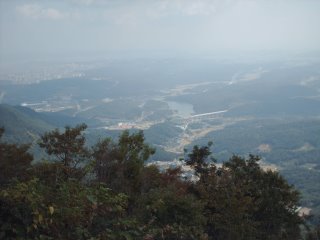
On a clearer day, one can literally see the entire city, all the way to the beach and Daewangam. I can't wait until the leaves start changing colors in earnest. So far, it's been spotty.
No More Smiley Faces
Friday marked the official end of Wal-Mart in Ulsan as the last remaining store became an E-Mart. Wal-Mart announced earlier this year that they would be selling 16 of their stores to Shinsegae, which owns E-Mart, an withdrawing from the Korean economy, just as Carrefour had done previously (even the former Wal-Mart Korea website has been shut down). I can't say that I shed any tears for the Walton clan, and the lack of a Wal-Mart in Ulsan has not effected me at all. However, I mention it here because Wal-Mart's experience in Korea is representative of other multinational corporations that have had trouble adjusting to the demands of Korean consumers. Officially, Wal-Mart was unable to win the market share here that it has in other locations, and plans on focusing more on its operations in China. Many Korean business analysts have pointed out several reasons why Wal-Mart and others have failed to break into the Korean market, mostly due to lack of creative brand promotion and failing to stock the items that Korean shoppers are interested in. For example, Wal-Mart insisted on stocking dry goods almost exclusively, whereas the large Korean retailers (E-Mart, Lotte, and Homeplus, which is actually owned by Tesco) all have an entensive grocery section in addition to selling clothing, electronics and what not. I often go to E-Mart to find food items that I can't get at my local grocer's (cheese, cream cheese and bagels, for example). Walking the floor, one is inevitably accosted by store employees, all trying to make a sale. Sometimes, they walk around shouting the specials into a bullhorn. There are free food samples everywhere, and at E-Mart at least, women in hanbok explaining about the special deals that week. Hi-Mart, another Korean retailer, has especially ostentatious store promotions, hiring scantily clad go-go dancers and blasting techno music in front of their store locations. Wal-Mart, apparently, did none of these things, making no attempt to localize its business model, and therefore the Korean consumers shunned them. But it's not just the retailers that have trouble succeeding in Korea. Nokia has had a particularly difficult time here, and Nokia phones are nowhere to be seen, with consumers opting for Samsung and LG instead. Even Google comes in behind the local search engine, Naver.com, which has a variety of functions including chatting, a Korean-English dictionary, on-line shopping and a forum for users to post questions for anyone to answer (all of my students rave about it, too). Admittedly, I wasn't a business major, and I haven't seen any data about Korean consumption patterns, but it does seem to me that Koreans have enormous pride in their national brands, like Samsung and Hyundai, and prefer them to foreign brands (tangential point: jobs with Samsung and Hyundai are eagerly sought by university graduates because the job is basically guaranteed for life and these companies provide amazing benefits for their employees, such as free college for their children. As a result, those jobs are highly competitive). It seems almost like a form of nationalist loyalty, although I might be overstating things there. At any rate, the yellow smiley faces are gone from the peninsula for now, perhaps forever.
Wednesday, October 11, 2006
Addendum
A short addendum to my previous post on North Korea: yesterday, one of my roommate's Korean friends called her to suggest that for the next few days she wear long-sleeved shirts and long pants (it's still warm enough here that neither are necessary, by the way) in order to avoid the potentially damaging effects of "nuclear fallout." For the record, the apparent nuclear test was conducted underground and I'm fairly positive that Ulsan did not suffer any ill effects. There is probably a greater risk to my health from my trip to the industrial park on Friday. Incidentally, the past couple of days here have been hazier than usual; I think we're experiencing some high pollution days, and I now understand why people here wear these.
Monday, October 09, 2006
Da Bomb
It's been an interesting past few days here on the peninsula in the globo-political sense, what with shots being fired across the DMZ on Saturday (actually not such an uncommon event), Foreign Minister Ban Ki-moon's impending appointment as UN secretary-general any minute now, and of course, the confirmation of North Korea's first successful nuclear test earlier today. I'm not an expert in Asian politics, or East Asian military strategy, and my knowledge of Korean history is amateurish at best, so I won't take this opportunity to simply rehash what I've read in the news and heard interchangable talking heads waste a lot of hot air over. I do however, know a little bit about media analysis and linguistic ideologies, so I can offer my take on what is being (and has been) said about North Korea and nuclear weapons. My daily pre-work routine inevitably includes tuning into CNN World (tangential note: I'm not a big fan of CNN, but it is the only English language news station we have on our cable plan, and they also broadcast "The Daily Show Global Edition" late night Saturdays), which is how I first heard about the nuclear test. What stood out most for me was that, between what amounted to asking the same question worded slightly differently of correspondents in Seoul, Tokyo, and Beijing, the CNN anchor in Atlanta took time to remind the viewing audience that "only CNN" has the "global reach" to be able to cover this story properly. I started to think, am I watching the news or a commercial for CNN? Also, what would BBC World have to say about that claim? But more seriously, each of the talking heads used similar language to describe North Korea: "isolated," "reclusive," removed from the "outside world," and even "pain in the butt." It wasn't so long ago that North Korea had attained "rogue state" status, or that Der Fuhrer was bestowing the "axis of evil" distinction on Kim Jong-il's Juche paradise. Statements like these are all strategic methods of marking North Korea, in the Jakobsonian sense. My personal opinion is that until we begin speaking about North Korea differently, the sense that there is a problem will persist indefinetely (but of course, in no way do I mean to say that allowing 2 million of your own citizens starve to death and doing little-to-nothing about it isn't a problem). In other words, the "fact" that North Korea (and its nuclear ambitions in particular) is a "problem" is partially embedded in the language we use to talk about North Korea, and therefore of our own doing.
One more note about my current neighbor to the north: in one of my classes a few weeks ago, I was discussing recreation with my students, specifically skiing, and one of the students related a story about a ski trip to a mountain in the north, near the DMZ. He added, excitedly, that he had "seen North Koreans" across the border when he was on top of the mountain. Some of the other students seemed impressed by his story, clearly exhibiting the "that-doesn't-happen-every-day" face. The way he described the experience was similar to the way other students have described a trip to the zoo, fascinated by catching a glimpse of the "exotic" and "rare."
One more note about my current neighbor to the north: in one of my classes a few weeks ago, I was discussing recreation with my students, specifically skiing, and one of the students related a story about a ski trip to a mountain in the north, near the DMZ. He added, excitedly, that he had "seen North Koreans" across the border when he was on top of the mountain. Some of the other students seemed impressed by his story, clearly exhibiting the "that-doesn't-happen-every-day" face. The way he described the experience was similar to the way other students have described a trip to the zoo, fascinated by catching a glimpse of the "exotic" and "rare."
Sunday, October 08, 2006
Downtown Nature
Yesterday I spent the afternoon wandering through Ulsan Grand Park, a large park in the center of the city. It is a slightly surreal experience to walk off the street near one of the busiest rotaries in Ulsan (Gongeuptap):
and suddenly find myself on hiking paths reminiscent of the trails out in Cheonsang:

I visited Ulsan Grand Park on my first day in the city, but I didn't have my camera then, as it was stranded along with my bags in Incheon. The park is so large that I imagine I could visit it ten times and never walk the same paths. Here are some of my favorite pictures from the day.
This building is picturesque, in a stereotypically Asian sort of way:
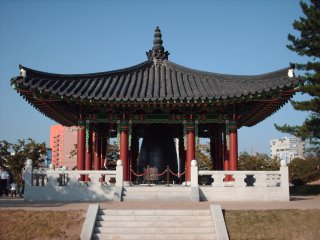
Here is a view of Samsandong (a.ka. "Three Mountains Town" a.k.a. "New Downtown") from a ridge in the park:

And finally, a close-up of a sculpture of a Korean soldier in the throes of death that adorns a Korean War Memorial:

and suddenly find myself on hiking paths reminiscent of the trails out in Cheonsang:

I visited Ulsan Grand Park on my first day in the city, but I didn't have my camera then, as it was stranded along with my bags in Incheon. The park is so large that I imagine I could visit it ten times and never walk the same paths. Here are some of my favorite pictures from the day.
This building is picturesque, in a stereotypically Asian sort of way:

Here is a view of Samsandong (a.ka. "Three Mountains Town" a.k.a. "New Downtown") from a ridge in the park:

And finally, a close-up of a sculpture of a Korean soldier in the throes of death that adorns a Korean War Memorial:

Friday, October 06, 2006
Chuseok/Misadventures
Today, Koreans celebrate chuseok, the so-called "Korean Thanksgiving." Although yesterday was also a public holiday, today is the day of the celebration itself. Seeing as I don't know any Koreans well enough to have been invited to a chuseok dinner, I cannot relate here a tale of participant observation, and instead have to rely on hearsay and a cursory search of internet resources. Chuseok has a 2,000 year+ history, dating back to the Silla Dynasty(57 B.C. to 935 A.D.) of the Three Kingdoms period. Some have claimed that the celebration grew out of a weaving contest organized by Silla King Yu-Rhee between two handpicked teams of expert female weavers. The losing team, as judged by the King, would have to prepare and serve a feast for the winning team with the freshly harvested autumn crops. Chuseok falls on the 15th day of the 8th month of the lunar calendar, and is bookended by two additional days of holiday in order to accomodate travel to and from the homes of elders. Typically, traffic is incredibly saturated throughout the nation on these days. The important aspects, as far as I can tell from what I have read and what my students have told me, include eating seasonal foods, especially songpyeon (a special variety of rice cake that is specifically associated with chuseok), visiting with extended family, paying respects to the dead and cleaning up the gravesites of ancestors (typically an activity for the elder males in the family), dressing in the hanbok, and lots of singing, playing games, and dancing. As far as my own observations, I noticed that many businesses were closed for the day (Cheonsang was an out and out ghost-town!), traffic in Ulsan was lighter, and the buses were less crowded. I spotted a few people wearing the hanbok, mostly young girls in Cheonsang, and as the bus I was riding downtown passed by the largest cemetery in Ulsan I noticed a long line of parked cars and people passing in and out of the cemetery gates (it also seemed to be a profitable day for the flower ajummas, who were camped outside of the gates). Chuseok is often compared to the American Thanksgiving; both are autumnal celebrations centered around eating special foods and spending time with family, but I think there are clearly too many differences to draw a direct comparison between the two.
I had hoped to be able to post some more pictures of the pastoral beauty around Ulsan during my time off this week, but my attempts at adventuring have not quite gone as planned. Yesterday, I decided to visit the Naewonam valley at the foot of Daeunsan, just south of Ulsan on the road to Busan. However, I soon realized that I had very little idea about where I was going or how long exactly the journey would take. I followed the directions in an officially sanctioned tourist map and hopped in the 507 headed out of town. Although I'm certain that I did indeed end up in the Naewonam valley, I was unable to find any clear markings to the trails around Daeunsan. Thus, I ended up hiking aimlessly up into the foothills, eventually ending up at a Buddhist temple hidden behind some rice fields and trees:
Having decided to abort the adventure for the present, I returned to the bus stop. Unfortunately, I hadn't taken into account the lack of priority that the Ulsan transit authority places on the 507 route and waited close to three hours for the bus to arrive. However, all was not lost, as I was able to observe firsthand the life of people outside of the city, watching men and women working in their gardens and fields. Today, my destination was Jangsaengpo, the Ulsan port and marine park. Jangsaengpo is also the location of the Whale Museum, which I correctly assumed would be closed because of the chuseok holiday. I had a romanticized vision in my mind of capturing a picture of the sunset over the Ulsan harbor. Instead, what I found was an industrial park the likes of which I'd never seen before, heavily polluted air, and several fishermen lined up along the shore catching creatures that I can only hope aren't the same ones that end up in my grocery store:
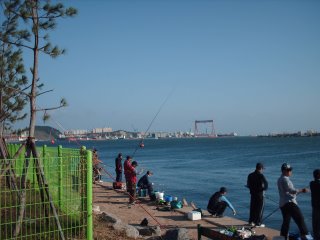
This, too, is Ulsan, and in a sense, a more authentic view of Ulsan than scenes of the Yeongnam Alps and Daewangam.
I had hoped to be able to post some more pictures of the pastoral beauty around Ulsan during my time off this week, but my attempts at adventuring have not quite gone as planned. Yesterday, I decided to visit the Naewonam valley at the foot of Daeunsan, just south of Ulsan on the road to Busan. However, I soon realized that I had very little idea about where I was going or how long exactly the journey would take. I followed the directions in an officially sanctioned tourist map and hopped in the 507 headed out of town. Although I'm certain that I did indeed end up in the Naewonam valley, I was unable to find any clear markings to the trails around Daeunsan. Thus, I ended up hiking aimlessly up into the foothills, eventually ending up at a Buddhist temple hidden behind some rice fields and trees:

Having decided to abort the adventure for the present, I returned to the bus stop. Unfortunately, I hadn't taken into account the lack of priority that the Ulsan transit authority places on the 507 route and waited close to three hours for the bus to arrive. However, all was not lost, as I was able to observe firsthand the life of people outside of the city, watching men and women working in their gardens and fields. Today, my destination was Jangsaengpo, the Ulsan port and marine park. Jangsaengpo is also the location of the Whale Museum, which I correctly assumed would be closed because of the chuseok holiday. I had a romanticized vision in my mind of capturing a picture of the sunset over the Ulsan harbor. Instead, what I found was an industrial park the likes of which I'd never seen before, heavily polluted air, and several fishermen lined up along the shore catching creatures that I can only hope aren't the same ones that end up in my grocery store:


This, too, is Ulsan, and in a sense, a more authentic view of Ulsan than scenes of the Yeongnam Alps and Daewangam.
Tuesday, October 03, 2006
When Heaven Opened
Today begins a welcome break from teaching for the rest of the week due to the confluence of two Korean public holidays. Apparently, it is rare that these holidays coincide with each other, and many of the Koreans I know tell me that working people lucked out this year as far as vacation time goes. Today, October 3rd, is known as Gaecheonjoel, which literally means something akin to "Opening of Heaven." In English, it is officially known as "National Foundation Day." The name refers to Korean mythology and the foundation of the Chosun kingdom in 2333 B.C. According to the story, the god-king Dangun opened up heaven and created the Korean nation. I have spent the day cleaning my apartment, cooking, going on a short hike and generally enjoying a break from work.
Take Me Out To The Ballgame
The Major League Baseball regular season officially ended yesterday and my team, the Boston Red Sox, failed to make the playoffs (their season was, for all intents and pruposes, over in August), hence the picture of me above looking sad while remembering better days. The season started out quite promising for my favorite bunch of idiots, but everything fell apart after the All-Star break (ill-timed injuries, bad front office decisions, primadonna players) and the Boston Massacre Part II sealed their fate. However, if there is a silver lining, it's that everything is back to normal for Red Sox fans. The World Series victory in 2004 was a wonderfully cathartic experience, but it did destroy the self-pity that Red Sox fans enjoy wallowing in. So now we can all get back to whining, and everything is right again in the universe.
Koreans like baseball, too, not as much as they like soccer, but it does seem to be fairly popular. As I mentioned previously, Ulsan does not have a baseball team, so I get my fix by watching games on television. American games are actually broadcast live, so I am usually able to catch one before going to work. As with other sports, the Koreans love to follow their own international superstars, and so the majority of the MLB games that are televised here involve teams that have Korean players, none of whom I knew before moving here. Thus, I have seen a lot of the Colorado Rockies (pitcher Kim Byung-Hyun), Tampa Bay Devil Rays (pitcher Seo Jae-Weong), Seattle Mariners (pitcher Baek Cha-Seung), and the Cleveland Indians (outfielder Choo Shin-Soo). All of these teams have one thing in common: none of them were even remotely contenders this season, so a lot of these games were some of the worst displays of baseball I've ever seen. Yet on occasion, there was a Red Sox game, including a game a few weeks ago when the Sox exacted some revenge against the Evil Empire (Yankees), which made my day.
I have also seen a few Japanese and Korean league games. A few things standout for me. First, the stadiums are almost always near empty, which leads me to think that the leagues aren't very profitable. Second, the games are usually great examples of small ball strategy, which is nice because I'm a fan of small ball. Finally, the names of the teams are, from my perspective, hilarious. There are a few, like the Yomiuri Giants (Japanese) or the LG Twins (Seoul, Korea) that borrow their names from American teams. But then there are others like the SK Wyverns (Inchon, Korea), the Hiroshima Toyo Carp (Japanese) and my personal favorite the Hyundai Unicorns (Suwon, Korea) which are named after animals that I would never associate with sports. Baseball has been relatively popular in Japan since its introduction in the 19th century and the establishment of the professional league in 1920 (and again in 1934), and it has become a home away from home for washed-up American players as well as a source of talent for the MLB, most notably Ichiro Suzuki. Professional baseball in Korea has a much shorter history, with the league beginning in 1982. All of Korea's eight professional teams are named for the corporations that own them, and aren't primarily associated with their home stadium. Korea does have one true baseball superstar who plays in Japan for the Yomiuri Giants, Lee Seung-Yeop, whose unofficial moniker is the "Lion King." He is also promoted by Korean television as the Asian home run king, and to his credit he is the youngest player in the world (United States included) to have hit 300 home runs (take that A-Rod!).
As far as the Red Sox are concerned, they'll be back to disappoint us in April 2007. Like a true fan, I'll be rooting for whoever the Yankees are playing against in the playoffs this October.
Koreans like baseball, too, not as much as they like soccer, but it does seem to be fairly popular. As I mentioned previously, Ulsan does not have a baseball team, so I get my fix by watching games on television. American games are actually broadcast live, so I am usually able to catch one before going to work. As with other sports, the Koreans love to follow their own international superstars, and so the majority of the MLB games that are televised here involve teams that have Korean players, none of whom I knew before moving here. Thus, I have seen a lot of the Colorado Rockies (pitcher Kim Byung-Hyun), Tampa Bay Devil Rays (pitcher Seo Jae-Weong), Seattle Mariners (pitcher Baek Cha-Seung), and the Cleveland Indians (outfielder Choo Shin-Soo). All of these teams have one thing in common: none of them were even remotely contenders this season, so a lot of these games were some of the worst displays of baseball I've ever seen. Yet on occasion, there was a Red Sox game, including a game a few weeks ago when the Sox exacted some revenge against the Evil Empire (Yankees), which made my day.
I have also seen a few Japanese and Korean league games. A few things standout for me. First, the stadiums are almost always near empty, which leads me to think that the leagues aren't very profitable. Second, the games are usually great examples of small ball strategy, which is nice because I'm a fan of small ball. Finally, the names of the teams are, from my perspective, hilarious. There are a few, like the Yomiuri Giants (Japanese) or the LG Twins (Seoul, Korea) that borrow their names from American teams. But then there are others like the SK Wyverns (Inchon, Korea), the Hiroshima Toyo Carp (Japanese) and my personal favorite the Hyundai Unicorns (Suwon, Korea) which are named after animals that I would never associate with sports. Baseball has been relatively popular in Japan since its introduction in the 19th century and the establishment of the professional league in 1920 (and again in 1934), and it has become a home away from home for washed-up American players as well as a source of talent for the MLB, most notably Ichiro Suzuki. Professional baseball in Korea has a much shorter history, with the league beginning in 1982. All of Korea's eight professional teams are named for the corporations that own them, and aren't primarily associated with their home stadium. Korea does have one true baseball superstar who plays in Japan for the Yomiuri Giants, Lee Seung-Yeop, whose unofficial moniker is the "Lion King." He is also promoted by Korean television as the Asian home run king, and to his credit he is the youngest player in the world (United States included) to have hit 300 home runs (take that A-Rod!).
As far as the Red Sox are concerned, they'll be back to disappoint us in April 2007. Like a true fan, I'll be rooting for whoever the Yankees are playing against in the playoffs this October.
Sunday, October 01, 2006
Ulsan Tigers

Today, my roomate Jessica organized a trip for we wayguk Ulsanites to go to Munsu Stadium in order to see the Ulsan Hyundai Tigers take on the Jeonbuk Hyundai team in a nationally significant match. I have loosely followed the exploits of Ulsan's soccer team, and know that they're actually quite a good team. Currently, they are battling for a spot in the Asian Champions League finals. But more so, in lieu of Ulsan having a local baseball team, I wanted to experience Ulsan's sports fanaticism in the only outlet available for Ulsanites: football (soccer). Munsu Stadium:
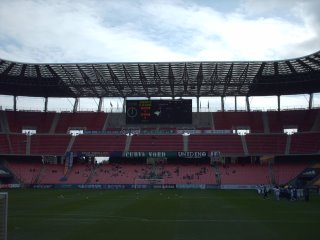
was built for the 2002 World Cup, hosted jointly by Korea and Japan, and thus is a fairly nice, new soccer stadium. Unfortunately, there weren't many fans who showed out for this match, only the diehard Ulsan fans:

and others who had nothing better to do on a Sunday afternoon. I enjoyed myself fully with my wayguk friends, Jessica, Brandon, and Melissa. The match itself was fairly uneventful. Ulsan made a few serious tries towards the end of the second half, but it ended in a 0-0 draw.
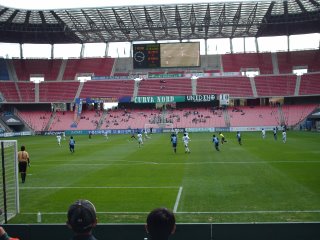
Hopefully, the Tiger's will fare better in the second leg of their Champions League semifinal. All in all, it was a fun outing to another of Ulsan's 12 designated scenic areas. ULSAN HYUNDAI!!!

